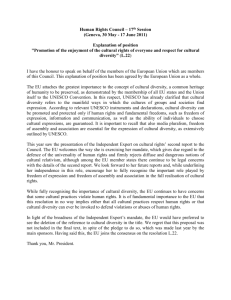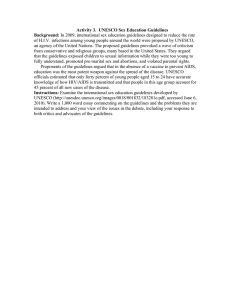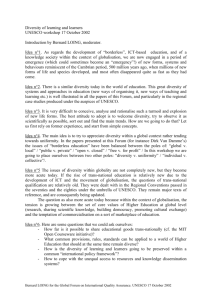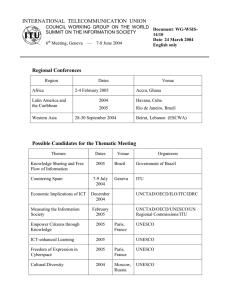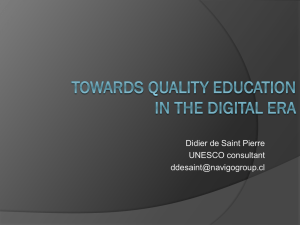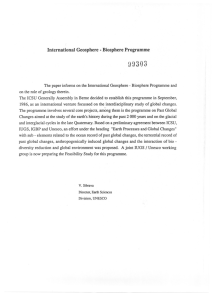Address by Mr Eric Falt Assistant Director
advertisement
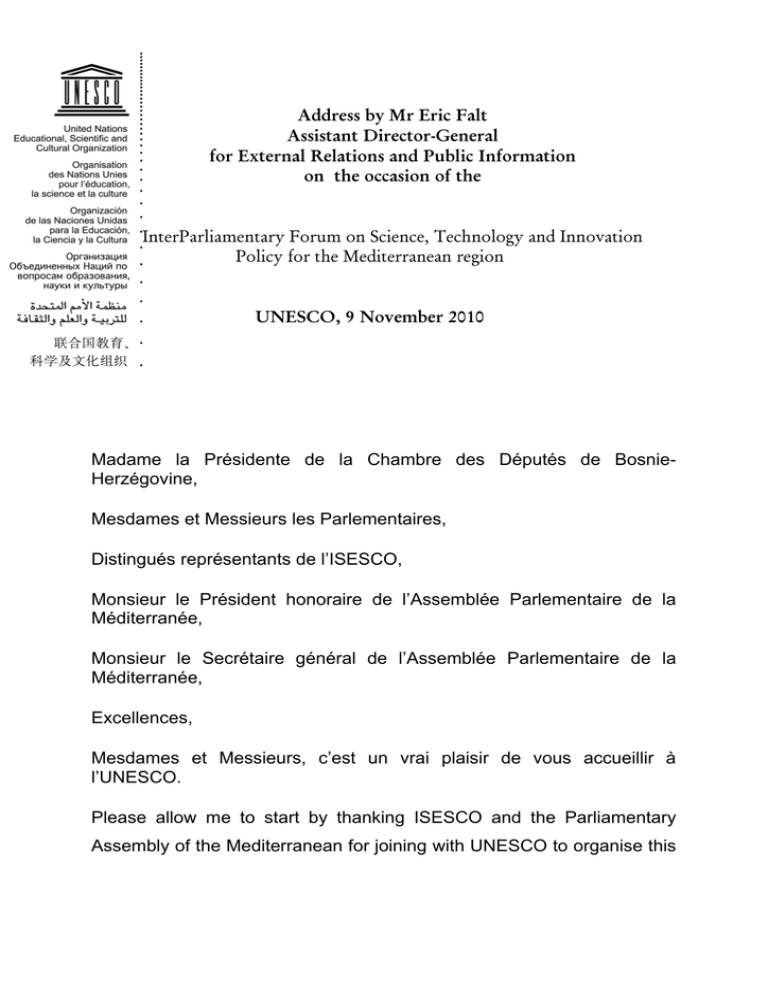
Address by Mr Eric Falt Assistant Director-General for External Relations and Public Information on the occasion of the InterParliamentary Forum on Science, Technology and Innovation Policy for the Mediterranean region UNESCO, 9 November 2010 Madame la Présidente de la Chambre des Députés de BosnieHerzégovine, Mesdames et Messieurs les Parlementaires, Distingués représentants de l’ISESCO, Monsieur le Président honoraire de l’Assemblée Parlementaire de la Méditerranée, Monsieur le Secrétaire général de l’Assemblée Parlementaire de la Méditerranée, Excellences, Mesdames et Messieurs, c’est un vrai plaisir de vous accueillir à l’UNESCO. Please allow me to start by thanking ISESCO and the Parliamentary Assembly of the Mediterranean for joining with UNESCO to organise this 2 Interparliamentary Forum on Science, Technology and Innovation Policy in the Mediterranean Region. Engaging with national Parliaments is vital for the success of UNESCO’s mandate. Responsible dialogue and debate lie at the heart of democracy. Parliaments play a vital role in fostering the pluralism that is necessary for informed exchanges and sharper national policies. This is all the more important as we seek to respond together to the core challenges that we all face today. Our Forum meets also in the context of the celebration of the World Science Day for Peace and Development. This is significant, and it is tied to the launch tomorrow of the UNESCO Science Report 2010. Sharper public policy can only be developed on the basis of a better understanding of the state of play. The Science Report provides unique insight to the landscape of science and technology today. The picture is that of deep change and it is fascinating. Along with distinguished Members of Parliament, this Forum brings together a wealth of expertise from scientific institutions, centres and associations in the Mediterranean region and beyond -- that are all deeply engaged with the national and regional governance of science, technology and innovation policy. The wealth of the Mediterranean region in cultural terms is beyond dispute. However, its future as a platform for exchange, trade and communication needs us to act now. 2 3 Long-term and sustainable development in the region can only be fostered if we tackle head-on the issues of environmental management and climate change. In this, the Mediterranean region illustrates well the blend of local and global imperatives that affect many other regions of the world. The pressures of change and uncertainty take different shapes in different regions, but they are universal. For all of this, we must get the paths from ‘science-to-policy’ and from ‘policy-to-science’ right. Channels of communication between scientists and policy-makers must become more effective. Science and policy have to advance together and they must be mobilized to work in the same direction. This is why the presence of so many scientists and representatives of scientific communities is so important at this Forum. We are stakeholders in a common project. It is time to set our watches together and coordinate our agendas more closely. We all know that this is not easy. Different pressures and priorities animate different actors on the path from science-to-policy and policy-toscience. Information and knowledge needs are not the same in different circles. Time frames are often conflicting. We do have mechanisms in place that are designed to strengthen the links between the science and policy worlds. But these are not enough. Traditional arrangements, such as the presence of policy makers on the boards of research institutions, have had little effect. 3 4 Scientists need to engage more closely with policy makers -- while retaining their independence in order to maintain credibility. At the same time, policy makers must actively seek a fuller dialogue with scientists, in order to communicate their information needs and to support the interaction between policy and research, as well as among scientists of relevant disciplines. This interaction can provide the basis for defining research programmes that are policy relevant and for ensuring more informed policy decisions. Civil society has also a key role to play in this process. More inclusive participation in the development and monitoring of science and technology policies is a source of energy and expertise. It is vital that we encourage greater transparency in decision-making relating to science. This starts with the legislative process – the setting of the legislative agenda and the procedures for legislative deliberations. Public hearings in standing committees, for instance, are excellent tools for participation and information-sharing. Of course, stronger and more relevant science education for the general public is vital for underpinning this. Finally, the communication of science must be strengthened. The communication of science that is undertaken by science journalists, science centres and writers plays a key role in developing wider science literacy. National and international organizations must recognize this and make the most of it. The speed and complexity of scientific development is increasing the stakes. 4 5 Excellencies, Ladies and Gentlemen, This Forum is an important part of UNESCO’s wider effort to reinforce its ties with parliamentarians around the world. Our aim is clear: it is to improve the governance of science through initiatives guided by the principles of participation and dialogue. Integrating better science and research into legislative processes is a key part of the answer. In recent years UNESCO, through innovative cooperation and establishment of Forums of Parliamentarians for Education in Africa, in the Arab States, in Asia and the Pacific and in Latin America and the Caribbean, created a unique network of interaction of Parliamentarians for exchange of ideas and best practices in educational policy making. This network could be also instrumental for exchange of ideas in the field of national and regional governance of science, technology and innovation policy. I look forward to your discussions and our debates. This partnership of parliaments and scientific communities along with science communicators and civil society is vital for identifying and developing the mechanisms necessary for dialogue and the better design of science policies. Thank you. 5 6 6
